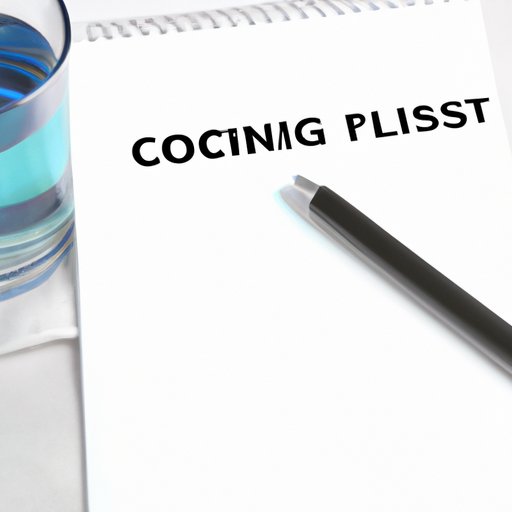
Introduction
A colonoscopy is a common procedure that helps doctors inspect the colon and rectum for signs of diseases such as colon cancer, ulcerative colitis, and Crohn’s disease. As important as the procedure is, what you eat and when you eat it can have a significant impact on the outcome of the procedure.
In this article, we will discuss the importance of following dietary guidelines before a colonoscopy. We will provide a comprehensive guide on fasting before a colonoscopy, including how long you should stop eating before the procedure, what you can and cannot eat, and why fasting before a colonoscopy is crucial for an effective colonoscopy.
The Importance of Following Dietary Guidelines Before a Colonoscopy
Proper preparation is critical to having a successful colonoscopy. When you prepare appropriately, your doctor can get a better view of your colon and rectum, improving the accuracy of the procedure’s results. One critical aspect of preparation is fasting before the colonoscopy.
When you fast before a colonoscopy, you give your digestive system time to empty the contents in your bowel, enabling your doctor to see more accurately. It can also help to reduce the risk of complications such as nausea and vomiting that can occur during and after the procedure. Fasting is, therefore, an essential part of ensuring that your colonoscopy is performed correctly.
No More Guessing Game: Here’s the Exact Timeframe for Stopping Food Intake Before a Colonoscopy
The timing of your fast is equally important as the contents of your diet. Doctors and medical professionals generally recommend patients to stop eating solid foods at least 24 hours before a colonoscopy. This timeframe enables the digestive system enough time to empty the bowel fully. However, the recommended time will vary depending on the clinic; some clinics may recommend stopping food intake twelve hours before the procedure.
Since the recommended timeframe can differ, it’s important to follow your doctor’s instructions carefully and to arrive for your colonoscopy fully prepared.
What to Eat and Drink, and When to Stop: A Comprehensive Guide for Pre-Colonoscopy Fasting
Before you stop eating, it’s essential to modify your diet adequately up to a week before the procedure. Foods that are high in fiber, such as vegetables, fruits, whole grains, seeds, and nuts, should be avoided. Dairy products, meat, fish, and poultry can also be part of the problem since they take longer to digest. Instead, stick to low-fiber options such as white bread and refined cereals.
During the fast, you can drink clear liquids such as water, clear broth (chicken or beef), pulp-free juice, tea/coffee (no cream), ice popsicles, and sports drinks. Sugary drinks and carbonated beverages are not allowed.
Stopping food in-take too early can leave you feeling weak and tired or dehydrated, making the fasting period unpleasant. However, breaking the fast too early can affect the results of your colonoscopy. Therefore, you should stop eating solid foods at least 24 hours before the procedure as advised by your doctor.
The Science Behind Fasting Before a Colonoscopy
Recent research indicates the numerous benefits of proper fasting before medical procedures such as colonoscopy. A 2016 study by the European Society of Gastrointestinal Endoscopy (ESGE) highlighted the importance of preparing your gut adequately before a colonoscopy by fasting to cleanse your gut.
Research also indicates that fasting before a colonoscopy can reduce the occurrence of complications during and after the procedure. A study published in the Journal of Clinical Gastroenterology found that fasting before a colonoscopy reduced the risk of complications such as vomiting during the procedure.
Tips and Tricks For Making The Fasting Period Before a Colonoscopy More Bearable
Fasting before a colonoscopy can feel tough, but it’s essential to ensure that your digestive system is empty, and the colonoscopy gets accurate results. Here are a few tips to help you manage the fasting period:
- Stock your home with clear broths and pulp-free liquid drinks to stay hydrated throughout the fasting period
- Stay away from the kitchen or rooms where there are food smells
- Use saltwater to minimize hunger pangs
- Meditation or simple exercises can help manage hunger pangs and keep you calm
Breaking Down The Myth of “Clear Liquids Only”
The phrase “clear liquids only” can be misleading and confusing for some people preparing for a colonoscopy. While this phrase suggests a limited list of allowed drinks such as clear water, broth, and clear juices, it doesn’t mean that other liquid drinks such as tea, coffee, and soft drinks with no cream should be avoided.
It’s important to follow your doctor’s guidelines on liquid intake to ensure proper preparation.
My Experience with Colonoscopy Prep
Going through the colonoscopy prep process can be stressful and challenging, but it’s crucial for your overall health. My experience with colonoscopy prep wasn’t easy. I found it hard to manage hunger pangs, but I discovered drinking saltwater helped me reduce my hunger levels.
Moreover, I discovered that taking frequent walks and engaging in simple exercises helped with the discomfort and pressure. Above all, I followed my doctor’s instructions and adhered to the recommended fasting period, which resulted in a successful colonoscopy procedure.
Conclusion
Preparing for a colonoscopy is an essential step in maintaining good colon health. Fasting before a colonoscopy is vital for proper preparation and an accurate diagnosis. This article has provided a comprehensive guide on what you can and cannot eat before a colonoscopy, the recommended timeframe for fasting before the procedure, and the importance of proper preparation for a successful colonoscopy.
By adhering to your doctor’s instructions on pre-colonoscopy fast, being mindful of what you eat and drink, and using the tips provided to make the fasting process more comfortable, you’ll be one step closer to healthy, disease-free, colon health.




